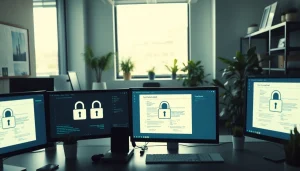Comprehensive Guide to Electrical Service: Ensuring Safety and Efficiency

Understanding Electrical Service
What is Electrical Service?
Electrical service is the process of supplying electricity to residential, commercial, and industrial properties, ensuring that they receive the necessary power for daily operations. It encompasses a wide range of activities from the initial setup and installation of electrical systems to their ongoing maintenance and repair. Understanding electrical service is crucial for homeowners and businesses alike, as it ensures safety and efficiency in power usage. For more comprehensive insights into this crucial service, consider exploring our guide on Electrical Service.
Key Components of Electrical Service
The components of electrical service can be broken down into various elements, including:
- Main Service Panel: This is the central hub where all electrical circuits branch out and connect to the external power supply.
- Circuit Breakers: These safety devices automatically shut off the electrical flow in case of overloads, thus protecting wiring and appliances.
- Wiring: The extensive network of wires throughout a building which carries electricity to different locations.
- Outlets and Switches: These are critical for safely connecting devices and controlling electrical flow.
- Grounding Systems: Essential for redirecting excess electricity safely into the ground, preventing shock and equipment damage.
Each of these elements plays a vital role in the overall functionality and safety of an electrical system, highlighting the need for professional oversight during installation and maintenance.
Importance of Professional Electrical Service
Engaging professional electrical services ensures that the installation and maintenance of electrical systems adhere to local codes and safety regulations. Moreover, trained professionals possess the expertise to identify potential hazards that could lead to equipment damage or personal injury. The benefits of hiring professionals include:
- Safety: Professionals follow strict safety protocols, reducing the risk of electric shocks, fires, and other disasters.
- Compliance: Ensuring all electrical work is done according to local specifications and standards.
- Efficiency: Trained electricians can troubleshoot and resolve issues quickly, minimizing downtime.
- Expert Advice: Professionals can offer insights on energy-efficient solutions that can save money and minimize environmental impact.
Types of Electrical Services Available
Residential Electrical Service
Residential electrical services cater to homeowners, addressing everything from new installations to repairs and upgrades. Typical services include:
- Wiring Installation and Repair: Proper wiring is crucial for any home, as it affects lighting and power availability.
- Electrical Panel Changes: Upgrading to a modern panel enhances capacity and safety features.
- Lighting Design and Installation: Expert electricians can help design wonderful lighting systems that improve ambiance and utility.
- Home Automation Systems: Integrating smart technology for energy management, safety, and convenience.
Commercial Electrical Service
Commercial electrical services deal specifically with businesses and large-scale operations, requiring robust, efficient systems to handle higher energy demands. Services include:
- Load Assessments: Determining the energy needs of commercial buildings to ensure appropriate power supply.
- Energy Audits: Assessing energy consumption patterns to identify savings opportunities.
- Lighting and Exit Signs: Installing and maintaining safety systems to ensure the wellbeing of employees and customers.
- Signage and Exterior Lighting: Enhancing visibility and branding through effective outdoor lighting solutions.
Choosing the Right Electrical Service Provider
Factors to Consider
When selecting an electrical service provider, consider the following factors to ensure reliability and quality service:
- Experience and Expertise: Look for providers with extensive service history and favorable customer reviews.
- Licensing and Insurance: Ensure that the service provider is fully licensed and insured to protect against liabilities.
Questions to Ask
Engaging with a potential electrical service provider can involve several key questions to gauge their qualifications:
- What is your experience with projects similar to mine?
- Can you provide references or testimonials from previous clients?
- What are your pricing structures and payment terms?
- Do you offer warranties or guarantees on your work?
Verifying Credentials and Experience
Before finalizing your choice, verify the provider’s credentials through industry associations and licensing boards. It’s common for reputable professionals to belong to networks that uphold standards of excellence, which indicates a commitment to ongoing education and adherence to the best practices within the field.
Common Electrical Service Issues
Identifying Electrical Hazards
Awareness of potential electrical hazards is vital for the safety of any facility. Common issues include:
- Frayed Wires: Damaged insulation can lead to short circuits or fires if not promptly addressed.
- Frequent Circuit Breaker Trips: This could indicate overloaded circuits or an underlying electrical problem.
- Burning Smells or Sparks: These signs should never be ignored; they often hint at severe electrical issues.
Signs You Need Electrical Service
Recognizing the need for professional electrical services can prevent problems from worsening. Some signs to watch for include:
- Flickering lights that are not due to high usage.
- Outlets overheating or discolored covers.
- Buzzing sounds from electrical panels or outlets.
- Loss of power in specific areas of the building without any clear reason.
Preventative Maintenance for Electrical Service
Preventative maintenance is key to reducing the likelihood of electrical failures. Best practices include:
- Regular Inspections: Scheduling routine visits from a qualified electrician can help identify potential problems early.
- Updating Old Wiring: Older wiring systems may not meet current safety standards and should be evaluated for possible upgrades.
- Routine Testing of Safety Devices: Ensuring smoke detectors, surge protectors, and GFCI outlets are functioning properly can protect against failure during critical times.
Future Trends in Electrical Service
Sustainable Electrical Solutions
As industries and households become more environmentally conscious, the demand for sustainable electrical solutions continues to rise. This includes:
- Energy-Efficient Lighting: LED technologies are not only cost-effective but also significantly reduce energy consumption.
- Solar Power Integration: Harnessing renewable energy sources is becoming more accessible due to advancements in solar technologies.
- Energy Management Systems: Businesses increasingly incorporate systems to monitor and optimize their energy use.
Smart Home Electrical Services
With the growing trend of home automation, smart home electrical services are becoming commonplace. Features often include:
- Smart Thermostats: Allowing homeowners to control heating and cooling efficiently.
- Smart Lighting: Enabling automated control over lighting systems for convenience and energy savings.
- Security Systems: Integrating monitoring cameras and alarms that can be accessed remotely.
Technological Innovations in Electrical Service
Emerging technologies are propelled by the pursuit of efficiency and safety enhancements in electrical service. Innovations include:
- Electrical Vehicle Charging Stations: With the rise of electric vehicles, more homes and businesses are installing their charging infrastructure.
- Power Quality Management: Advanced systems that prevent disturbances and ensure stable electricity flow.
- Remote Diagnostic Tools: Allow technicians to diagnose issues without being on-site, enhancing service efficiency.







